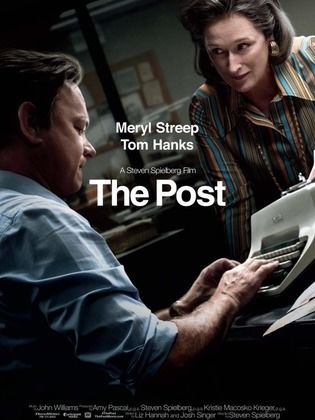‘The Post’ lacks depth and candid perspective
Steven Spielberg fails to bring authenticity to the disclosure of the Pentagon Papers in newest film

Documentation of the Pentagon Papers revealing the unscrupulousness of the Vietnam War, Steven Spielberg tackles overwhelming themes of feminism, morality and holding government in contempt.
“The Post” is everything that we have seen in Steven Spielberg’s previous works, however the film lacks a consistent theme.
This film depicts when New York Times first got ahold of the Pentagon Papers during the Vietnam War, assessments that would reveal an entire lineage of presidents that knew the war was a lost cause.
The Washington Post, a small local newspaper, led by publisher Katherine Graham (Meryl Streep) and editor-in-chief Ben Bradlee (Tom Hanks), would get ahold of the same documents and be faced with the difficult choice to publish them or not.
Spielberg attempts to integrate a feminist theme into the film, by showing that Graham, publisher by inheritance and not choice, found empowerment through her decision to publish the Pentagon Papers at the risk of going to jail.
However, the weaknesses in this argument can be found through Spielberg’s determination to stick to historical fact. Instead of stretching how Graham used her executive power elsewhere, he advertised the fact that her only real contribution to releasing the Pentagon Papers was saying the word. It was unclear whether she was motivated by upholding freedom of the press, or she was simply rebelling against her oppressive, but knowledgeable board.
In the very scenes where Graham expresses how oppressed she feels as a woman in a man’s world, the dialogue is lengthy and unnatural. Spielberg tried to dive into the female perspective, but failed because he is not a female director.
Through this failed theme, he also aims to present the importance of freedom of the press, which although displayed abundantly, is overshadowed by the abrupt ending right after the Supreme Court ruling denounced barring the press with the Espionage Act.
Another significant theme that was expected about such an obscure war as Vietnam, was the morality of the politics being executed at the time.
With the opening scene of the Vietnamese war zone, that was all too similar to “Saving Private Ryan,” the audience only gets a glimpse at the lives being put in jeopardy and ultimately served as the purpose for the Pentagon Papers being released in the first place.
To add insult to injury, the veteran cast did little to improve the realism of the film. Streep and Hanks had a very awkward dynamic that fails to mirror Graham and Bradlee’s real-life relationship. This inaccuracy is shown in Spielberg creating a power balance between the two characters in the movie, when in actuality, Bradlee clearly had more authority than Graham. With its preachy morals and agonizing two-hour run time, “The Post” is nothing more than a typical Spielberg movie.












